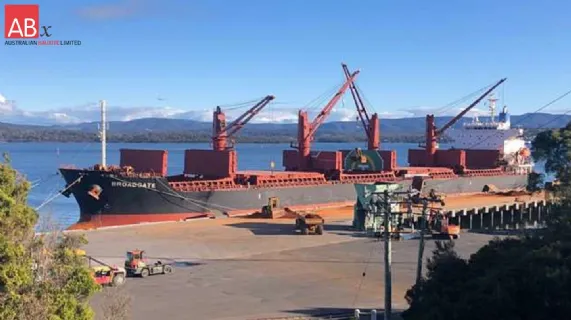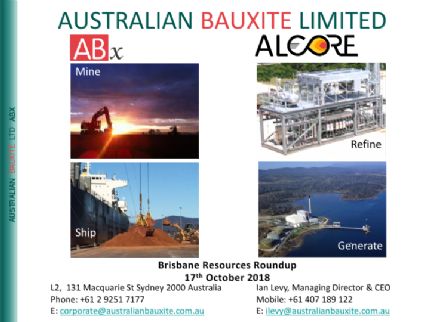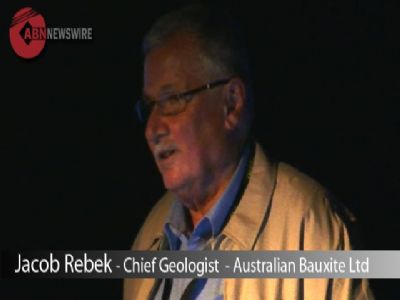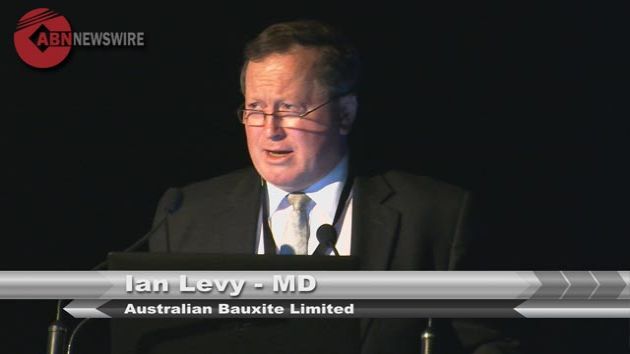
Alcore Economic Assessment
Sydney, Nov 18, 2020 AEST (ABN Newswire) - Australian Bauxite Limited ( ASX:ABX) (
ASX:ABX) ( A7B:FRA) provides the following economic assessment of its 89% owned subsidiary ALCORE Limited (Alcore) and in particular work being undertaken to process aluminium fluoride (AlF3) by Alcore (AlF3 Project).
A7B:FRA) provides the following economic assessment of its 89% owned subsidiary ALCORE Limited (Alcore) and in particular work being undertaken to process aluminium fluoride (AlF3) by Alcore (AlF3 Project).
- AlF3 is a strategically important mineral because it is an essential ingredient for aluminium smelting. It is also being investigated for advanced lithium-ion batteries
- Australasian aluminium smelters currently rely entirely on imported AlF3
- AlF3 imports by Australasian smelters from China alone in the last 12 months totalled more than 26,000 tonnes averaging US$1,266 per tonne
- Alcore plans to be the first domestic producer of AlF3 which will diversify and increase security of supply for Australasian smelters and enable export to other smelters worldwide
- The Alcore process is the world's first production of AlF3 from the recycling of aluminium smelter waste and from ABx's gibbsite-rich clean bauxite
- Alcore is routinely producing AlF3 of commercial composition and bulk density in the laboratory
- Alcore uses the aluminium-related parts of the CORE Technology (patent application)
Updated economic assessment
According to Roskill, a respected industry analysis company, in 2019:
- The operating cost of most global AlF3 production was between US$1,000/t and US$1,500/t
- 75% of existing commercial AlF3 production costs are raw materials, mainly fluorspar and aluminium hydroxide.
The Alcore process uses lower cost raw materials, offering a significant reduction in operating cost:
- Fluorine from aluminium smelter waste, instead of from purchased fluorspar
- Aluminium from bauxite or aluminium smelter waste, instead of purchased aluminium hydroxide
Alcore's costs: The cost advantage of fluorine from aluminium smelter waste allows Alcore to begin low-risk commercial production, initially from aluminium hydroxide, before expanding to processing bauxite or aluminium-rich smelter waste, which reduces costs but is not essential in early years of production to make the project attractive.
The operating cost range for Alcore's early years of production is estimated to be US$800-$950 per tonne of AlF3, based on the likely costs of raw materials for a plant in Bell Bay, northern Tasmania. This will place Alcore in the lowest cost quartile of global production.
The cost is based on purchased aluminium hydroxide and recycled aluminium smelter waste as the source of fluorine. Future cost reductions from using bauxite or aluminium-rich smelter waste are upsides.
Prices: The median long-term AlF3 price is US$1,175/t and market prices are currently near this value (see Figure 1*). This provides an attractive operating margin for Alcore.
The Alcore process predominantly uses standard processing equipment, minimising the cost and risk of development.
Current Alcore activities
1. Conducting engineering validation, which is likely to include a pilot plant for critical process steps, to:
- Confirm process and product performance at a larger scale
- Produce larger samples for evaluation by aluminium smelters
2. Conducting process verification experiments in the laboratory to:
- Optimise process conditions to ensure that required physical properties of AlF3 are consistently achieved
- Produce AlF3 from bauxite and aluminium smelter waste of equivalent quality to that produced from aluminium hydroxide
- Optimise the recovery of fluorine from aluminium smelter waste, including the separation and recovery of by-products with potential commercial value
Commercial
- Market prices for AlF3 are mainly determined by the Chinese export price set on the basis of freeon-board in Chinese Ports, which is published daily and monthly by China Customs. The median long term AlF3 price is US$1,175/t (see Figure 1).
- Alcore plans to be the domestic first producer of AlF3, at an industrial site in Bell Bay, northern Tasmania; an industrial precinct that currently has an aluminium smelter, a manganese smelter, an aluminium powder plant, a skilled workforce and experienced engineering firms.
- Alcore plans to commence with a production module of 10,000 tonnes of AlF3 per year, and steadily construct up to five production modules of the same size, for a total of up to 50,000 tonnes of AlF3 per year. This represents a small percentage of the 1.5 million tonne global market for AlF3.
Government & Industry
Discussions continue with governments, agencies and with major companies in the aluminium industry. Alcore considers AlF3 to be a strategically important mineral product.
Comment: Alcore CEO, Mark Cooksey commented: "For the process selected for our first 10,000 tonnes/year production module, we have demonstrated all of the key requirements at the laboratory scale. The updated economic assessment confirms that this is a very attractive project. We are accelerating the engineering validation for the first production module."
*To view tables and figures, please visit:
https://abnnewswire.net/lnk/OS2E0683
About ABx Group Limited
 ABx Group Limited (ABx) (ASX:ABX) is a uniquely positioned Australian company delivering materials for a cleaner future.
ABx Group Limited (ABx) (ASX:ABX) is a uniquely positioned Australian company delivering materials for a cleaner future.
The three priority projects are:
- Heavy rare earths: Supplying light and heavy rare earths from Tasmania into Western supply chains
o Processing Options Analysis conducted in partnership with external experts
- Clean fluorine chemical production: Producing industrial chemicals from aluminium smelter by-product (ALCORE)
o Continuous pilot plant under construction in Bell Bay, Tasmania
- Near-term bauxite production: Mining bauxite resources for the aluminium, cement and fertiliser industries
o Agreements executed with Good Importing International for bauxite projects in Queensland and New South Wales, and $2.7 million initial payment has been received
o Approvals well advanced for DL130 bauxite project in northern Tasmania
ABx endorses best practices on agricultural land and strives to leave land and environment better than we find it. We only operate where welcomed.
| ||
|









